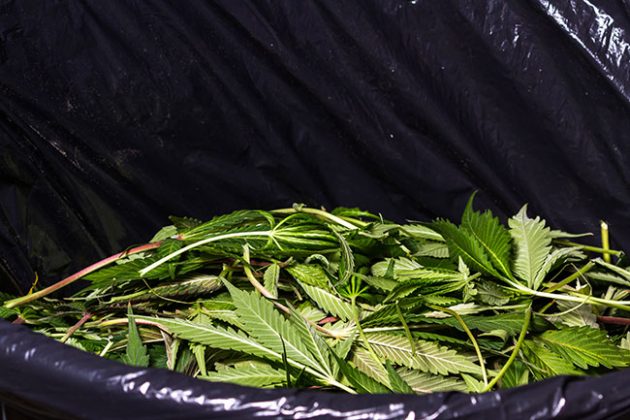
Features
Cultivation
Practice makes perfect
With limited regulatory inspections micro producers need to beef up internal compliance measures
March 15, 2021 By David Brown
 Delayed inspections and site visits from the regulators should not be cause for complacency. Instead, microcultivators must exert extra effort in ensuring that SOPs are adhered to on a consistent basis. Photo: © Me studio / adobe stock
Delayed inspections and site visits from the regulators should not be cause for complacency. Instead, microcultivators must exert extra effort in ensuring that SOPs are adhered to on a consistent basis. Photo: © Me studio / adobe stock The last year has been a unique one for the Canadian cannabis industry. The major societal changes due to the COVID-19 pandemic have obviously been far-reaching, impacting all aspects of our lives. Even Health Canada has had to make major changes to how they manage and oversee licence holders and their activities due to social distancing protocols and shutdown measures.
For example, in March 2020, Health Canada put out a memo stating that there would be a modified approach to its enforcement and regulatory activities, such as a delay of on-site inspections, which was extended several times throughout the year.
Acknowledging the logistical issues surrounding stay-at-home measures, employee health, and the possibility of some key positions at some licence holders possibly being unable to visit the facility, Health Canada also allowed licence holders to temporarily designate alternative security-clearance personnel in instances where the primary security clearance personnel would be unable to be on site.
Health Canada also announced that federal cannabis licence holders were no longer required to submit an amendment for review and approval by the regulator for the addition of any new operation areas within an approved building that already appears on a licence; and changing an operations area, such as changes to cameras, locks or layout, within an approved building that already appears on a licence.
Some of these measures have since been lifted, but shows a desire and ability to streamline aspects of the regulations when it comes to compliance.
Even prior to COVID-19 the regulator has been steadily evolving its own regulatory system, including how they oversee compliance of licence holders. Five years ago, licensed cannabis producers could expect regular visits from Health Canada inspectors, both announced and unannounced, lasting from a few hours to several days.
But as the number of licence holders has increased, especially post-legalization, the regulator’s approach also had to shift. In 2019, a cannabis cultivator or processor, depending on its size, might only see the inspector once or twice. Even with new virtual inspections during the COVID era, some licence holders, especially micros and nurseries, are going months after their final licence approval inspection before having a formal follow-up.
While in many ways this lack of constant oversight can be welcome, it can also lead to licence holders getting complacent. The ever-present fear of an inspection can keep a licence holder on their toes, carefully following SOPs. When given more leeway, some companies can get accustomed to cutting corners, allowing bad habits to become standard. Over time, this can create challenges not just for the eventual (in-person or virtual) visit from Health Canada’s Regulatory Operations and Enforcement Branch, but also for business operations as it can also lead to on-site errors, potentially harming the viability of the business.
Ensuring that you and your team understand and carefully adhere to your own SOPs can also help mitigate against risks like product recalls, accidents on site, security concerns and others.
After all, you designed your facility and SOPs for a reason. If you take the time to create them, you should ensure you and your team take the time to follow them.
Dealing with recalls is one key piece of any licence holder’s SOPs, and one we have recently seen several new micro producers have to address. Ensuring you can quickly and effectively respond to the possibility of a product recall can save you time and money in the long run, as well as your reputation with distributors, retailers and consumers.
Record keeping is another important piece of compliance no licence holder should overlook. Not only will accurate record keeping ensure your facility is running as efficiently as possible, it will help in future inspections (on-site or virtual), where it’s not uncommon to have inspectors requesting numerous records in regard to your daily operations.

Having a standard for facility cleaning is also a good habit to ensure that unexpected site visitors are met with a clean facility, showing them you take these measures seriously. Photo: © wollertz / adobe stock
Basic SOPs
For visitor check-ins
Do employees know your company’s protocols for checking in visitors? Although this is an aspect that can easily be overlooked when the visitor is someone your employees know, cutting corners here can create bad habits that may be accidentally repeated during a Health Canada inspection.
Use any visit to your facility as an opportunity to do a “dress rehearsal” for what a visit from the regulator might be like. Ensure employees who are responsible for checking in visitors know and understand your SOPs for check-in, and follow them accordingly.
Cleaning schedules
Cleanliness at your facility is obviously incredibly important in ensuring your facility runs smoothly and your products are safe. Having a standard for facility cleaning is also a good habit to ensure that any unexpected site visitors are met with a clean facility showing them you take these measures seriously.
While a leaf on the floor or trash in the corner might seem inconsequential in terms of facility operation, to a site inspector, these can be red flags that point to other more systemic non-compliance. Take the time to do it right, every time.
Quality assurance
For stand-alone microcultivators who are not required to have a quality assurance person (QAP) on staff, ensuring you and your team are carefully following your SOPs will fall upon the owner/site manager, as well as any distribution and sales partners.
Not having a QAP isn’t an excuse for not adhering to strict quality assurance measures.
Virtual inspections
Several micro licence holders have experienced a virtual inspection in the last year following Health Canada’s COVID-19 measures. Here are a few things they’ve experienced that you should be prepared for when your time comes.
Be prepared to potentially spend several days in a row online with inspectors. Your daily operations may be impacted by this, so plan accordingly. If you have other daily activities you need to engage in, once you are informed of an upcoming virtual inspection you should take the time to adjust your schedule to account for activities like feeding and watering, site maintenance, etc. Or, assign these tasks to someone not taking part in the inspection.
Have your records handy. Health Canada could ask you for your records relating to any aspect of your operation, from harvest days and yields, to cleaning schedules, to sales records, and much more. Have everything ready beforehand to ensure you aren’t scrambling to find documents in the moment.
Be polite and patient. Inspectors are humans too and their job is not to “bust” anyone, but to ensure compliance. Any inspection will result in at least a few minor observations. This doesn’t mean the inspector is out to get you, it just means they are doing their job.
Push back, firmly and politely. If there is an observation or request you disagree with, don’t be combative. You can firmly but politely ask questions or seek clarification without becoming rude or antagonistic. Inspectors are more likely to engage in constructive conversation if approached respectfully. If you disagree with something your inspector says, it’s absolutely your right to challenge it, but the path you take in how you challenge it can have a major impact on how successful you are. Treat people as you wish to be treated.
David Brown is the founder of StratCann, a cannabis industry publication with a special focus on micros and nurseries. Prior to founding StratCann, David was a senior policy advisor to Health Canada’s cannabis branch from 2018 to 2020, working – among other things – with the regulation team on the crafting of new licence categories like micros and nurseries.
Print this page